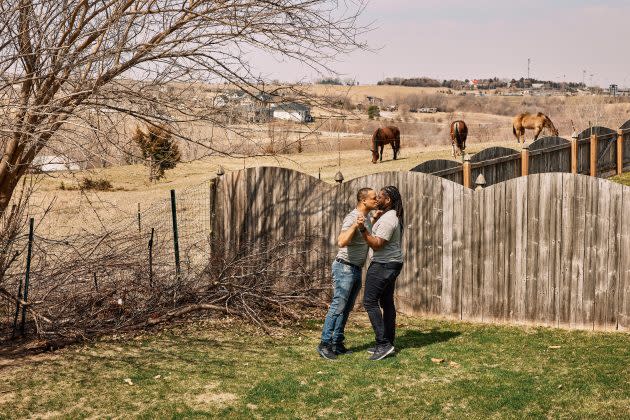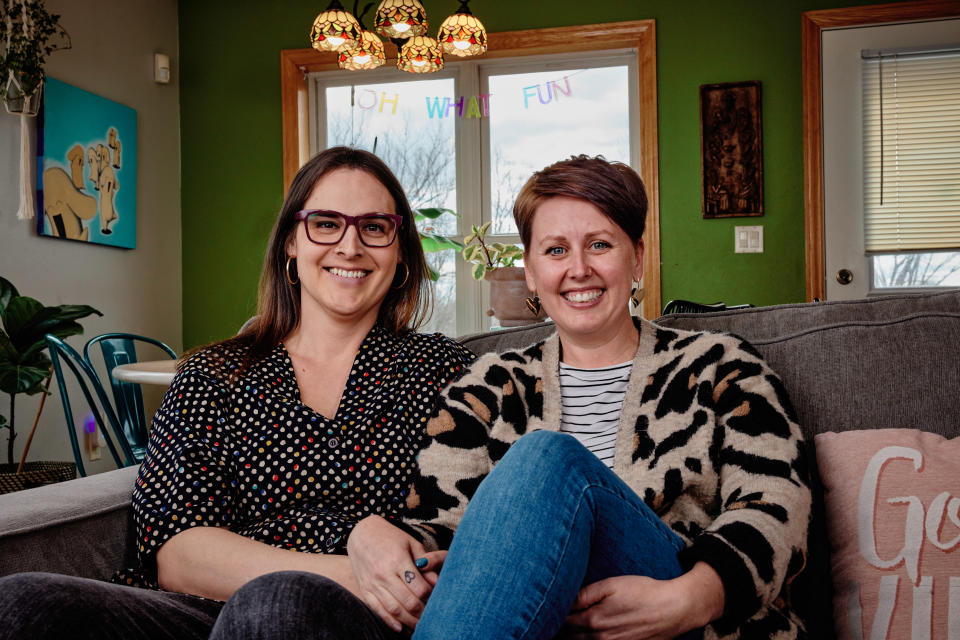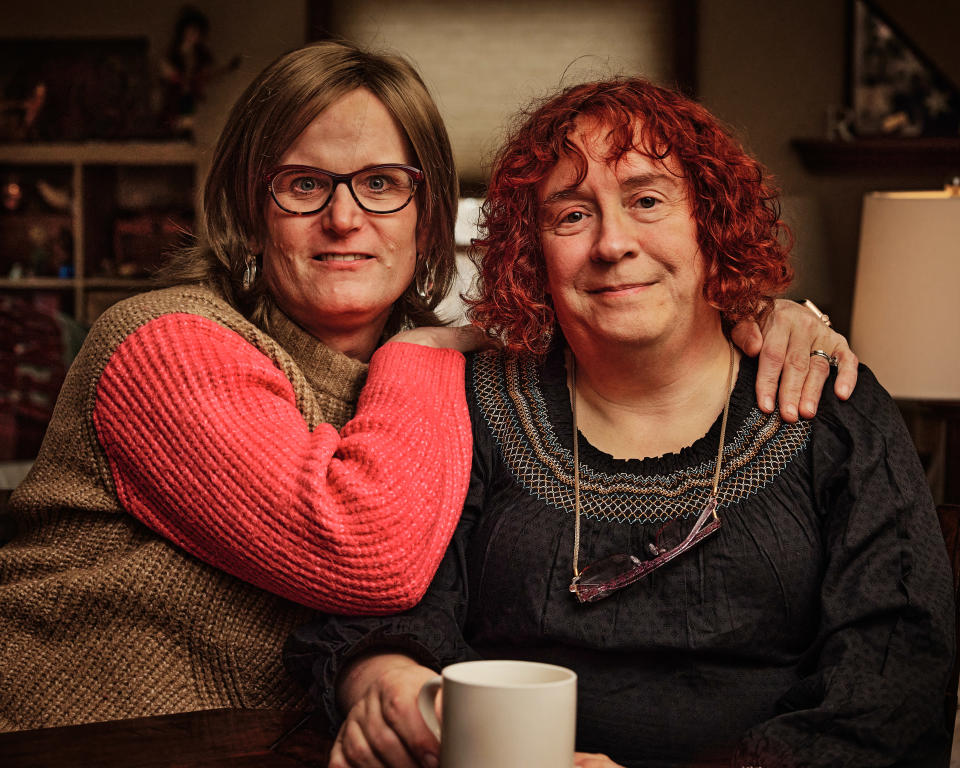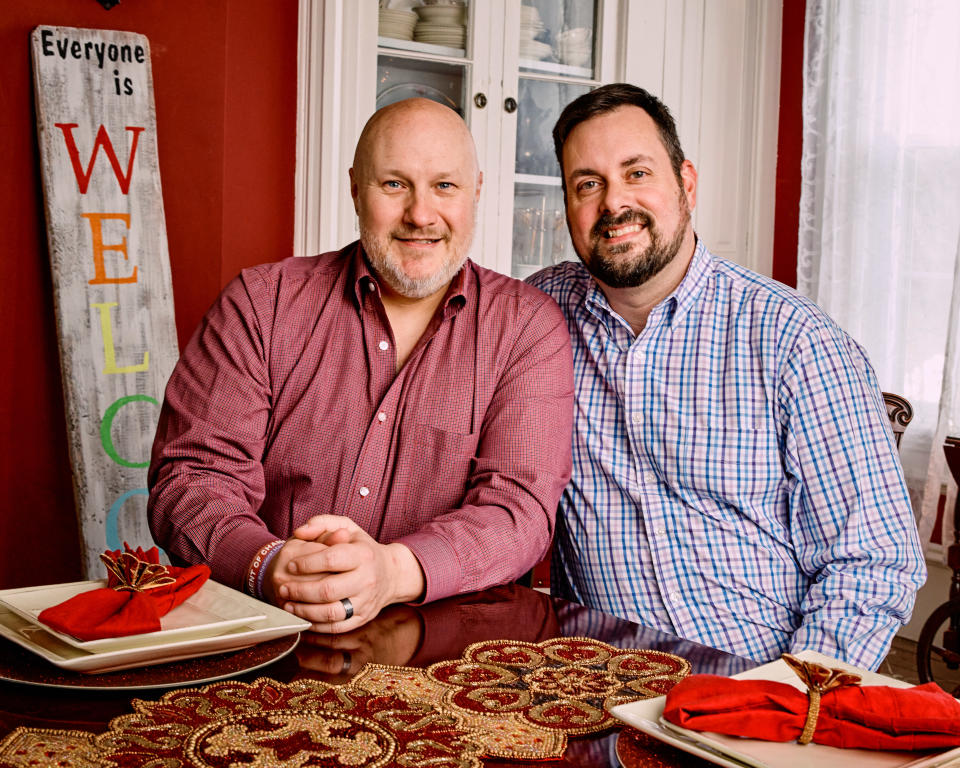‘We Live Here: The Midwest’ Hulu Documentary Shines Light On LGBTQIA+ Standing Strong In Heartland Against Backlash

In the wake of a Donald Trump presidency in 2016, in addition to the rise of anti-Gay legislation which posed a threat to the marriage equality decision in Obergefell v. Hodges, filmmaker Melinda Maerker and producer David Clayton Miller took the time to check in on the LGBTQIA+ community in the Midwest.
Here was a place of American family values, rattled by rising discrimination; yet several LGBTQIA+ spouses and families opted to stay strong in their communities and live true to themselves. The new Hulu movie, We Live Here is a window into their struggle in schools, churches, and their neighborhoods.
More from Deadline
Kim Kardashian Re-Teams With Ryan Murphy, Will Star In Hulu Legal Drama Series From 'AHS' EP
Sammy Davis Jr. Limited Series Not Going Forward At Hulu, Will Be Shopped Elsewhere

Of those featured in We Live Here, there’s a trans/queer Iowan family, Nia and Katie Chiaramonte, who must find a new community with their five kids after being expelled from their church. There’s Mario and Monte Foreman-Powell, a gay Black couple with a young daughter who test the line of acceptance in Nebraska. Debb and Jeff Richmond, a couple in Minnesota, are struggling to rebuild their families after their transitions. A farming lesbian couple Denise and Courtney Skeeba homeschool their bullied son in Kansas. On the positive side, the documentary shows Russell Exlos-Raber, a gay teacher in Ohio who is creating a safe space for LGBTQIA+ students.
Getting full access to these families wasn’t an easy task, and took time for the documentarians to gain their trust.
“Melinda and I had reached out to a lot of people, and while many were very interested and wanted to be a part of the documentary, they feared a lot of recriminations that they would get, particularly from their job. It was difficult. In fact, while we were on the road, we went to Wisconsin and the next family backed out on us. So, there was a mad scramble,” said Clayton Miller at the movie’s LA premiere about making the documentary which premieres on Hulu on Dec. 6.
Commenting at the premiere about their decision to stay put in Kansas, Denise Skeeba says “land is very cheap and we can afford 20 acres there,” while Courtney Skeeba added, “we’ve always had the courage to be in the community and represent our family as being just like every other family. That’s what keeps us going to try and push forward a new perception of what family is and including everyone in all spaces, in all definitions and how they want to be.”
For many of those looking to identify and be accepted as LGBTQIA+, as well as teach the greater populace, there’s hope in educational programs around the country, but even that is an uphill battle.

Says Jenn Richmond, “I remember, back in the ’80s, going through junior high biology classes, and you never heard about different relationship families at all, and in today’s world, they’re learning so much more in school about, you know, lesbian, gay, bisexual, trans-identified families, but I still don’t think it goes far enough. It took me coming out for my daughters to probably get immersed enough in it to actually understand what it means.”
Richmond continued, “There’s legislators who are trying to keep it away in school.”
“That’s the reason we have a lot of mental health struggles going on in schools today, is because they’re not taught some of the basics anymore, and stuff is being taken away from them, and they’re having to learn in the world of what things mean. Then they come and ask questions, and it’s not always an answer their parents want to or are willing to give. I credit my ex-wife a lot to bringing the understanding to my kids, and it was a very tumultuous time in a relationship. For her to bring that guidance to me, to my daughters, meant a lot to me,” Richmond added.
Ohio teacher Russell Exlos-Raber is one of those making a difference in his Fremont community, becoming a mentor to students who are struggling to come out and identify themselves.

“I think it’s one of the great blessings that we have as educators, and I’ve transitioned sort of over into the mental health counseling, and it’s just a different way of working with kids. It’s a great honor to be that representative and to give them a safe space and to let them know that you’re perfect the way you are and that if other people around you are telling you otherwise, that’s not okay, because you are authentically you, and that’s who you’re supposed to be, and I try to live my life that way,” said Exlos-Raber.
Added his partner Mark at last week’s premiere, “One of the things Russ does is he works on the Fremont Pride Board, which is in the town we actually live in. We’re trying to make sure all the kids out there have a safe space, because the worst thing in life, and all of us have been through it that’ve come out in any capacity, it used to feel lonely, and you feel lonely like you have no one else. That is a very hard thing to take. So, I’m very proud of this man. Very proud.”
While Hulu hasn’t greenlit a second edition of We Live Here, Clayton Miller says he and Maerker are already “researching other families right now; we’d like to continue the project.” That next area on the map to be covered by We Live Here is the South.
Best of Deadline
2023 Premiere Dates For New & Returning Series On Broadcast, Cable & Streaming
2023-24 Awards Season Calendar - Dates For Oscars, Emmys, Grammys, Tonys, Guilds & More
Colman Domingo To Receive Palm Springs Film Festival's Spotlight Award, Actor
Sign up for Deadline's Newsletter. For the latest news, follow us on Facebook, Twitter, and Instagram.

